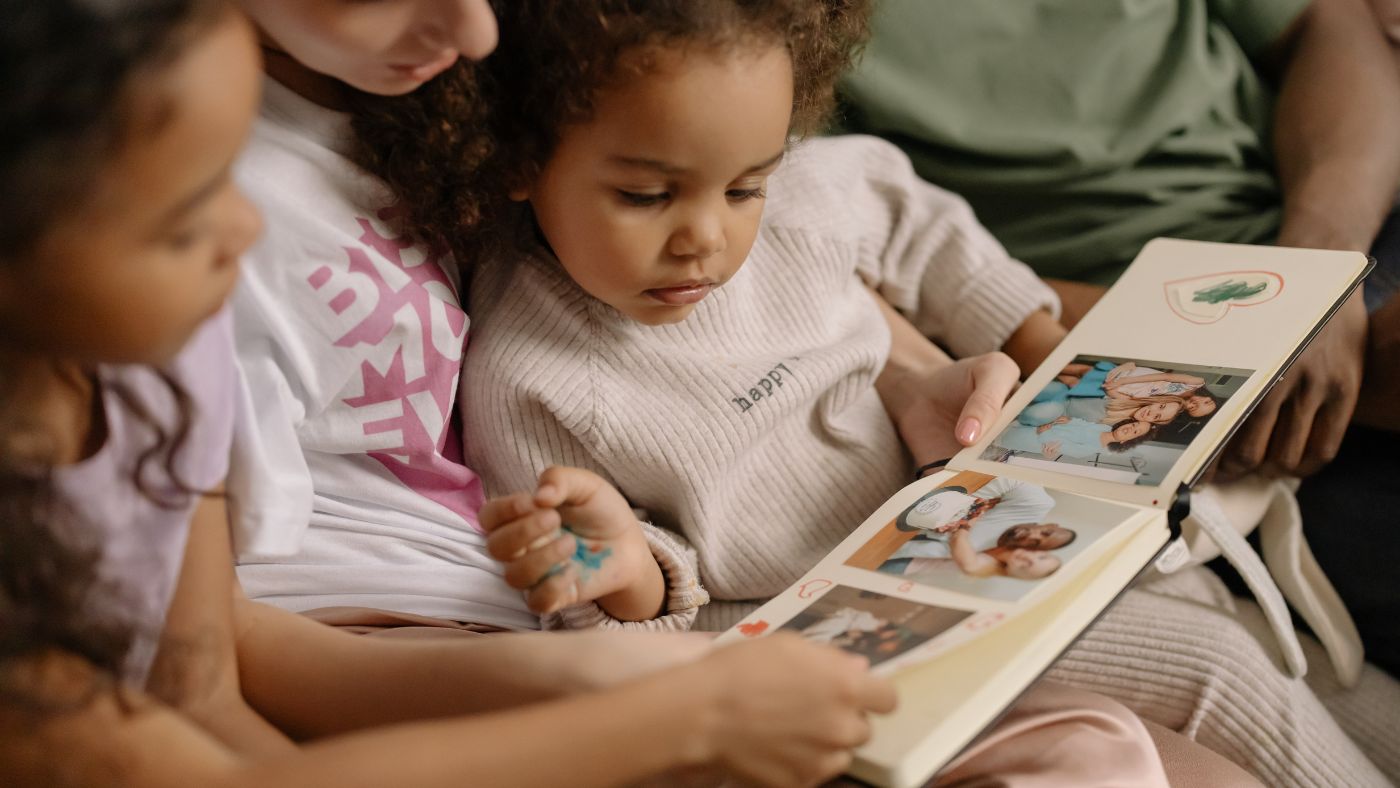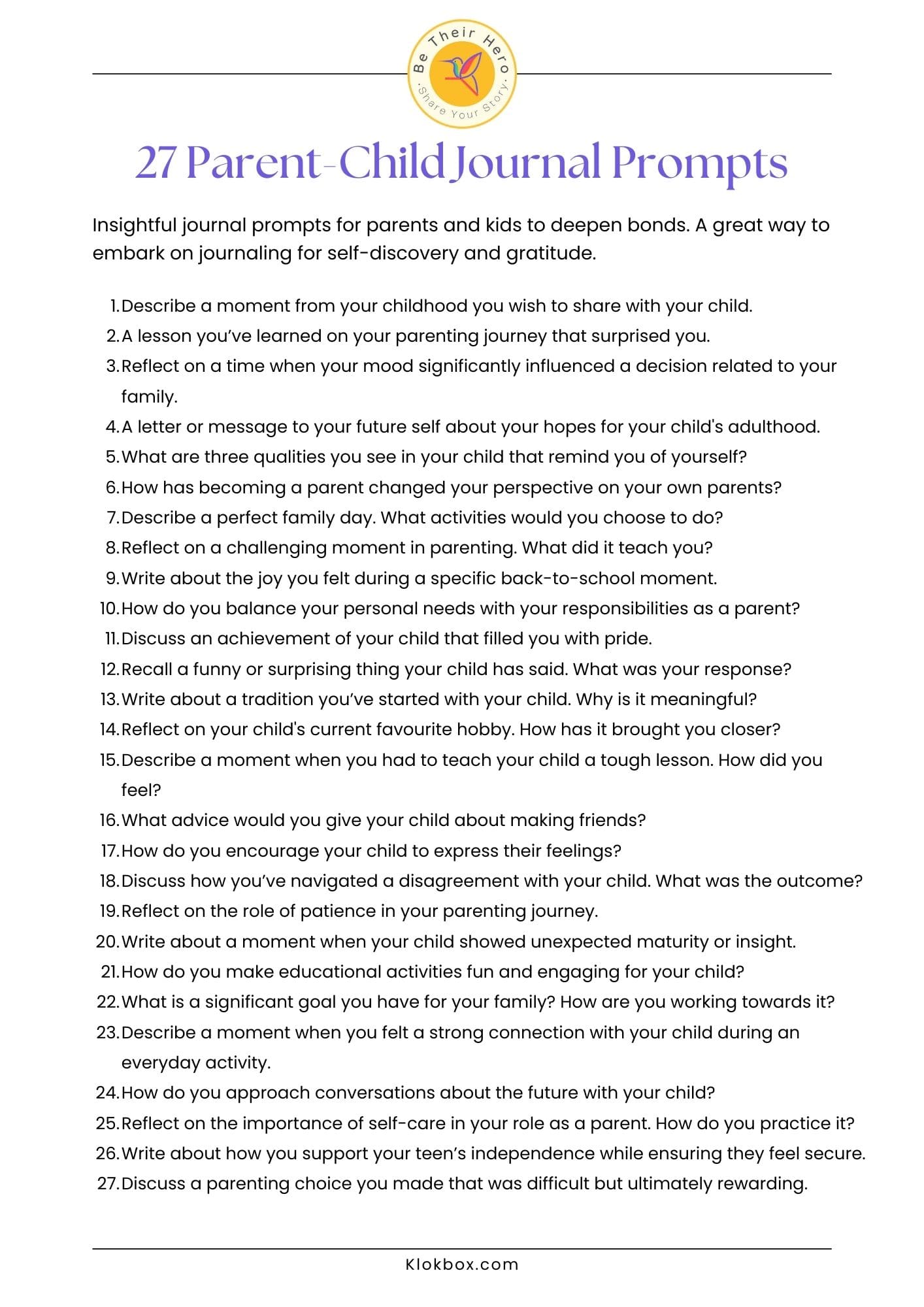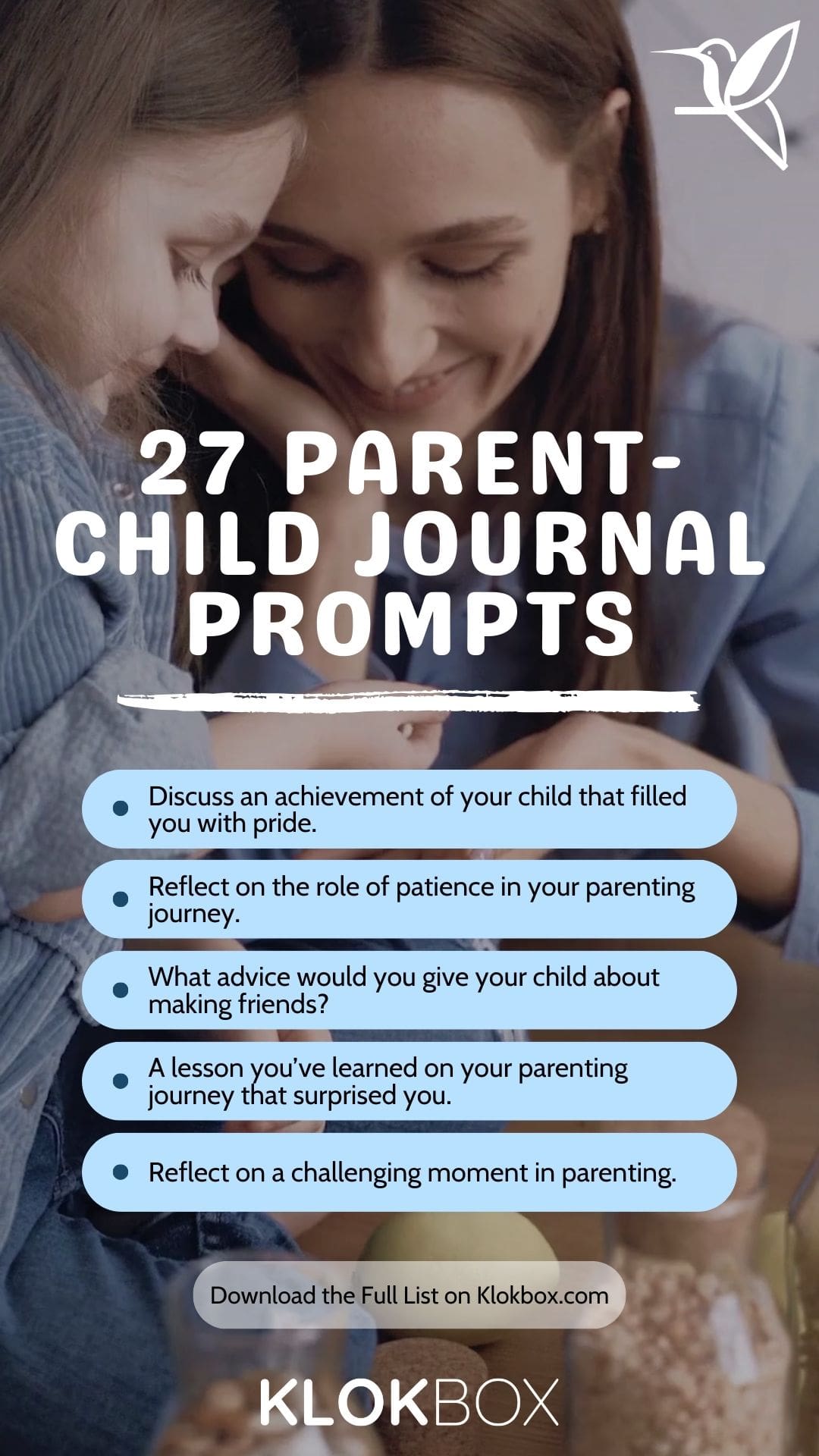Parenting is a journey filled with love, laughter, and challenges. One way to enhance this journey is through a parent-child journal. This unique tool not only strengthens the bond between parent and child. And also improves communication, emotional intelligence, and understanding.
Explore the benefits of keeping a Parent-Child Journal:
How to start one, prompts to get you started, and how to use it to address conflicts effectively. Discover the power of this simple yet powerful tool in building a strong parent-child relationship.
Key Takeaways
Discover the Power of Journaling for Parents. What is a Parent-Child Journal?
A Parent-Child Journal is a shared journal kept by a parent and their child to foster a deeper emotional connection. That could be done through reflective writing, positive affirmations, and encouragement. Therefore creating a space for personal growth and understanding.
This special journal serves as a platform for parents and children to engage in meaningful conversations, express thoughts, feelings, and experiences. Also, strengthen their bond through shared writing experiences.
By engaging in regular journaling parents and children can:
-
Develop a deeper understanding of each other’s perspectives
-
Build trust through open communication
The act of writing and sharing in your journal allows both parties to connect on a deeper emotional level. Enhancing their relationship and creating a safe space for expression and connection.

Journaling as a Path to Self-Discovery for Moms. How Can a Parent-Child Journal Help in Strengthening the Relationship?
A Parent-Child Journal serves as a powerful tool in strengthening the parent-child relationship by fostering emotional connections, promoting personal growth, and enhancing understanding and empathy between parents and children. You do that through:
-
The exchange of positive affirmations
-
Support
By engaging in shared journaling activities, parents and children can deepen their emotional bond and cultivate a sense of mutual understanding and respect. The act of writing and sharing thoughts, feelings, and experiences in a safe space…
Encourages open communication and allows both parties to express themselves authentically.
This practice not only builds trust, but also creates a supportive environment. Where children feel validated and heard, leading to increased self-esteem and confidence.
What are the Benefits of Keeping a Parent-Child Journal?
Keeping a Parent-Child Journal offers numerous benefits, including:
-
Improved emotional intelligence
-
Enhanced relationship skills
-
Strengthened family bonding
-
The creation of lasting memories
-
Quality time spent together
-
A platform for authentic self-expression
Through maintaining a journal, parents and children can develop:
-
A deeper understanding of their emotions
-
Learn effective communication strategies
-
Navigate conflicts with empathy and understanding
This shared activity fosters a sense of trust, openness, and connection within the family unit.
Allowing for moments of reflection and celebration of growth.
The act of journaling together cultivates a safe space for self-discovery. Encouraging creativity and self-awareness while building a treasure trove of shared experiences. That can be cherished for years to come.

Improved Communication
One of the key benefits of a parent-child Jjurnal is the improvement in communication between parents and children. Fostering open dialogue, encouraging thoughtful responses, and developing relationship skills. Enhancing emotional intelligence, and promoting vulnerability for deeper connection.
By providing a safe and structured space for sharing thoughts and feelings…
The Parent-Child Journal offers a platform for both parties to express themselves without fear of judgment. This practice of expressing emotions and experiences through writing helps individuals…
Understand their own feelings better and gain empathy for each other.
Through regular use of the journal, children learn to articulate their thoughts clearly. While parents can provide guidance and support, nurturing a stronger understanding of each other’s perspectives and emotions.
Increased Bonding
Engaging in a Parent-Child Journal leads to increased bonding between parents and children. Through shared writing exercises, bonding activities, and building rapport.
Strengthening bonds, creating lasting memories, building trust, spending quality time together.
Therefore fostering a deeper emotional connection.
By actively participating in the journaling process…
Parents and children have the opportunity to engage in meaningful conversations, express their thoughts and feelings, and collaborate on shared goals.
The act of writing together not only enhances communication skills… But also promotes active listening and understanding. Through this shared experience… Family members can reflect on their experiences, celebrate milestones, and work through challenges together. Thereby creating a strong foundation for an enduring bond. It nurtures a safe space for vulnerability and authenticity. Enabling family members to express themselves openly and build trust in each other’s perspectives.

Enhanced Emotional Intelligence
Maintaining a Parent-Child Journal contributes to enhanced emotional intelligence.
-
Empowering children and parents to deepen their emotional understanding,
-
Fostering emotional development
Encouraging empathy and enhancing emotional resilience for better emotional connection.
Through consistent journaling…
Both parents and children engage in reflective practices that help them recognize and articulate their feelings effectively. This shared activity creates a safe space for open communication. As well as the validation of emotions.
Leading to a stronger bond and increased understanding between family members. By exploring emotions together in a non-judgmental environment…
The Parent-Child Journal promotes active listening, validation, and mutual respect. All vital components of emotional intelligence and healthy parent-child relationships.
Better Understanding and Discovery of Each Other
By engaging in shared journaling activities and reflecting on each other’s thoughts and feelings… The Parent-Child Journal serves as a safe space for open communication and expression. It allows both parties to explore emotions, dreams, and aspirations, leading to a deeper connection and mutual respect.
The act of journaling together instils a sense of trust and understanding. Enabling parents and children to navigate challenges effectively. While celebrating each other’s achievements and uniqueness.
This process not only strengthens the parent-child bond… But also enhances problem-solving skills and promotes a positive attitude towards communication and collaboration.

Record, Relive and Share Your Stories
In the whirlwind of our daily lives, capturing the fleeting moments that shape our stories and emotions is invaluable. For parents embarking on the journey of nurturing their children’s growth…
Integrating journaling into their routine offers a unique opportunity. Klokbox, with its commitment to helping people capture, relive, and share their life stories…
Inspires both parents and kids to record a memory a day. Utilizing these journaling prompts is not just an exercise.
It’s a doorway to enriching your child’s self-esteem and fostering a habit of self-care. As well as being there for them at all times.
Tips on How to Start a Parent-Child Journal?
Starting a Parent-Child Journal involves selecting a suitable journal, setting a dedicated time and place for journaling. And establishing rules and guidelines to ensure a safe space for
-
Sharing
-
Encouragement
-
Self-expression
-
Building trust between parent and child.
Start Journaling and Capturing
-
Choosing an appropriate journal for this shared activity is crucial. Opt for one that resonates with both you and your child’s preferences. Whether it’s a simple notebook, a personalized journal or a digital platform.
-
Once the journal is selected, set a consistent routine for journaling. Perhaps before bedtime or during a quiet moment in the day. That way you create a structured and predictable environment for this bonding experience.
-
Establish clear rules together. Such as respecting each other’s thoughts, feelings, and privacy, to promote open and honest communication.

Choose a Journal – Physical or Digital
Journaling is a great way for kids to practice putting pen to paper, articulating their thoughts, and expressing their opinions. It offers a fun way for them to get comfortable expressing themselves. With prompts varying from daily reflections to imaginative explorations. Whether it’s through a new journal, a simple diary, or a digital platform like Klokbox…
The act of writing down what’s happening around us, how we feel, and what we dream of can have profound effects on clarity, intention, and healing.
Journal entries can pave the way for deeper conversations, fostering a strong bond and understanding between the two. The format of the journal itself can also make a difference.
With sections dedicated to expressing thoughts, feelings, and aspirations. Through these creative writing exercises, individuals can explore their emotions, dreams, and experiences, leading to self-discovery and a sense of achievement.
What are Some Prompts for a Parent-Child Journal? Thought Provoking Entries
These prompts serve as a gateway for parents and children to explore their thoughts, express emotions, and strengthen their connection in meaningful ways.
Journal entries can range from imaginative storytelling sessions to heartfelt letters, gratitude lists. Or even collaborative drawings that showcase the unique dynamics of their relationship.
By engaging in these activities… both parties are encouraged to listen actively, show appreciation for each other’s perspectives. And also build a foundation of trust and support.
The process not only nurtures creativity…
But also cultivates a safe space for openness and growth within the parent-child bond.

27 Printable Journal Prompts for Parents
-
Describe a moment from your childhood you wish to share with your child.
-
A lesson you’ve learned on your parenting journey that surprised you.
-
Reflect on a time when your mood significantly influenced a decision related to your family.
-
A letter or message to your future self about your hopes for your child’s adulthood.
-
What are three qualities you see in your child that remind you of yourself?
-
How has becoming a parent changed your perspective on your own parents?
-
Describe a perfect family day. What activities would you choose to do?
-
Reflect on a challenging moment in parenting. What did it teach you?
-
Write about the joy you felt during a specific back-to-school moment.
-
How do you balance your personal needs with your responsibilities as a parent?
-
Discuss an achievement of your child that filled you with pride.
-
Recall a funny or surprising thing your child has said. What was your response?
-
Write about a tradition you’ve started with your child. Why is it meaningful?
-
Reflect on your child’s current favourite hobby. How has it brought you closer?
-
Describe a moment when you had to teach your child a tough lesson. How did you feel?
-
What advice would you give your child about making friends?
-
How do you encourage your child to express their feelings?
-
Discuss how you’ve navigated a disagreement with your child. What was the outcome?
-
Reflect on the role of patience in your parenting journey.
-
Write about a moment when your child showed unexpected maturity or insight.
-
How do you make educational activities fun and engaging for your child?
-
What is a significant goal you have for your family? How are you working towards it?
-
Describe a moment when you felt a strong connection with your child during an everyday activity.
-
How do you approach conversations about the future with your child?
-
Reflect on the importance of self-care in your role as a parent. How do you practice it?
-
Write about how you support your teen’s independence while ensuring they feel secure.
-
Discuss a parenting choice you made that was difficult but ultimately rewarding.
Download this Free Printable Journal Prompts for Moms and Dads
Describe a Moment You Felt Proud of Your Child
Reflecting on a moment of pride related to your child in the journal fosters:
-
Encouragement
-
Positive affirmations
-
Emotional connection
-
Personal growth
-
Strengthening the bond between parent and child.
This journal allows parents to capture precious moments and achievements. Creating a treasure trove of memories to look back on. Sharing these reflections with your child opens up conversations that go beyond the surface…
Deepening the understanding and connection between both parties. By acknowledging and celebrating each other’s successes. Parents and children can build a foundation of support and love that will be cherished for years to come. This practice not only boosts self-esteem…
But also instils a sense of belonging and security within the family unit.

What Are Three Things You Appreciate About Each Other?
Expressing appreciation for each other through shared entries in your Parent-Child Journal nurtures
-
Building trust
-
Fostering support
-
Cultivating love and empowerment
-
Strengthening relationships through mutual acknowledgement and gratitude.
By regularly sharing appreciative thoughts and reflecting on each other’s positive qualities, individuals…
Not only boosts their self-esteem but also deepens the connection between them. This process of exchanging heartfelt words fosters a sense of belonging. And reinforces the bond between parent and child, promoting a healthy and loving dynamic in their relationship.
Share a Memory That Makes You Laugh
Sharing a memory that evokes laughter in the Parent-Child Journal enhances the connection, promotes fun activities, the sharing of happy moments, and strengthens emotional bonds by reliving joyful experiences together.
Recounting these humorous stories not only cultivates a sense of joy and unity within the family… But also serves as a valuable keepsake for future generations to cherish.
By exchanging humorous memories in your journal… Parents and children can create a treasure trove of shared experiences that will be cherished for years to come. Forming a unique bond founded on love, laughter, and the joy of being together.
How Do You Show Love to Each Other?
By documenting your expressions of love… Parents and children create a valuable archive of their emotional journey together.
Capturing moments that may otherwise be fleeting.
Reflecting on these entries not only reinforces the bond between them. But also provides a platform for open conversations about feelings and experiences.
This practice not only nurtures individual development… But also contributes to a harmonious and supportive environment where both parties feel valued and secure.
In essence, the Parent-Child Journal becomes a shared space where love, trust, and shared experiences flourish.

Journaling is A Great Tool to Address Conflicts
Utilizing your journal for conflict resolution involves documenting issues, sharing perspectives, active listening. And collaboratively finding solutions, fostering emotional development, thoughtful responses, empathy, and stronger conflict resolution skills.
By documenting disagreements in the journal…
The parent and child can gain a clearer understanding of each other’s viewpoints, which promotes empathy and emotional development. This process encourages active listening. Where both parties listen attentively to each other’s feelings and concerns. Through practising empathy and thoughtful responses…
You can work together to find creative solutions that satisfy both parties. Ultimately strengthening their relationship and enhancing their conflict-resolution abilities.
Write Down the Issue. What Stresses You Out?
This process allows you to reflect on their emotions and perspectives, leading to mutual respect and empathy. It encourages the development of problem-solving skills and teaches individuals how to express themselves effectively.
This shared practice also strengthens the parent-child bond by fostering a sense of collaboration and solidarity. Through consistent use of the journal families can:
-
Cultivate a culture of validation and appreciation for each other’s feelings
-
Resulting in a more resilient and harmonious relationship.

Share Your Perspective
By sharing your viewpoints in the journal… You have a unique opportunity to step into each other’s shoes and see situations from a different angle. This process of perspective-sharing not only helps in validating each other’s feelings…
But also aids in uncovering underlying concerns or motivations that may not have been previously understood. Through this exchange…
A sense of mutual respect and openness is cultivated, laying a strong foundation for effective communication and cooperation in tackling future conflicts.
Listen to Each Other’s Point of View
Engaging in active listening in the Parent-Child Journal fosters understanding, conflict resolution, trust-building, and growth. By valuing and acknowledging each other’s points of view during disagreements, promotes a harmonious relationship.
Encouraging attentive listening practices not only helps the child feel heard. But also allows the parent to grasp the underlying emotions and needs behind the expressed words. This deeper understanding not only aids in resolving conflicts effectively… But also cultivates empathy within the parent-child dynamic.
By actively listening, parents demonstrate respect and concern for their child’s perspective. Which, in turn, strengthens the bond through mutual respect and validation of feelings. This process of active listening lays a foundation for open communication…
Creating a safe space for the child to express themselves and fostering a growth-oriented, supportive environment within the parent-child relationship.
Find a Solution Together
Collaboratively seeking solutions promotes effective conflict resolution. The development of relationship skills, empathy-building, and communication enhancement…
Fostering a sense of unity and mutual understanding within the parent-child dynamic.
Working together to address challenges in your journal…
Not only strengthens the bond between parents and children. But also provides an opportunity for both parties to learn from each other’s perspectives.
Through this collaborative problem-solving process… Children can feel empowered to express themselves while parents can offer guidance and support. Creating a safe space for open communication and understanding.
By engaging in joint problem-solving…
Families can establish a healthy foundation for handling conflicts. Fostering resilience, and nurturing a culture of respect and cooperation.

Why You Should Start Kloking Today?
Starting Kloking today offers you a unique opportunity to
Capture and preserve the fleeting moments of life through journal prompts and reflections.
It encourages a deeper emotional connection with yourself and your loved ones. By providing a platform for sharing memories, thoughts, and feelings. By kloking, you create a personal and shared history. That enriches your relationships and provides a tangible reminder of life’s precious moments. Therefore making every day more meaningful and connected.
Parents can use journal prompts as a tool to get to know their children better…
Seeing the world through their eyes.
It’s also a great way to teach responsibility, offer inspiration, and encourage them to respond with their genuine thoughts and feelings.
Keeping a journal can help your child see the value in their voice and experiences… Validating their feelings and encouraging them to share more openly.
Can You Stick With It for 30 Days?
Embarking on a 30-day journaling journey is more than a commitment to write in the journal daily…
It’s an invitation to explore, reflect, and grow.
By integrating these 27 journal prompts into your routine, you’re not just responding to questions. You’re engaging in a practice that encourages back-and-forth communication.
Deepens understanding, and strengthens bonds, especially with teens.
Starting Kloking today is an easy-to-get-started. It’s a valid approach to capturing life’s moments and the emotions they carry. Remember… A journal is a great way to supply you and your children with a reminder of your journey, your growth, and the shared experiences that define your family.
So, would you say you’re ready to print these prompts and begin? Let this be the nudge you need to respond right and embark on a path of meaningful discovery.

Frequently Asked Question
Parent-child journaling prompts are prompts designed to encourage communication and connection between parents and children. They can help facilitate meaningful conversations and strengthen the parent-child bond.
Parent-child journal prompts are beneficial because they provide a structured and guided way for parents and children to communicate and share their thoughts, feelings, and experiences with each other. They can also help improve communication skills and foster a stronger relationship.
Yes, Parent-Child Journal Prompts can be used to address specific topics or issues that may be affecting your child, such as family conflicts, school stress, or emotions. You can choose prompts that are relevant to the topic or create your own based on your child’s needs.
Examples of Parent-Child Journal Prompts include “What is something you’re grateful for today?”, “What is your favourite memory with your family?”, and “What is something you are looking forward to in the future?” These prompts can be adapted or expanded upon to fit different ages and situations.



